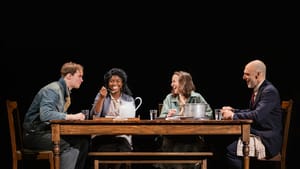Stay in the Loop
BSR publishes on a weekly schedule, with an email newsletter every Wednesday and Thursday morning. There’s no paywall, and subscribing is always free.
A new kind of jukebox musical
Ensemble Arts Philly and the Schubert Organization present Conor McPherson and Bob Dylan’s Girl from the North Country

During the intermission of Girl from the North Country, now onstage at the Forrest Theatre on the Philly stop of its North American tour, I found myself pondering, "Who exactly is the target audience for this?" While the unexpected arrangements of 20 career-spanning Bob Dylan songs prove delightful, this captivating production skillfully sidesteps the pitfalls of boomer nostalgia. Conor McPherson's narrative, a depression-era social drama reminiscent of Thornton Wilder and Clifford Odets, defies easy marketing categorization and demographic targeting.
Set against the backdrop of Duluth, Minnesota, during the Great Depression, Girl from the North Country unfolds as a distinctive amalgamation of McPherson's acclaimed storytelling and Dylan's timeless music. The narrative revolves around the Laine family, with their boarding house serving as a sanctuary for the downtrodden during challenging times. Nick Laine (John Schiappa), burdened by financial woes and a loveless marriage, oversees the house, while his wife Elizabeth, portrayed with finesse by Jennifer Blood, grapples with dementia. Despite occasional hints of the Mystical Disability Trope in McPherson's script and direction, Blood's portrayal remains grounded and sturdy, avoiding any descent into pity.
The Laine family's dynamics extend to their alcoholic son (Ben Biggers) and their Black adopted daughter (Sharaé Moultrie), who is anticipating motherhood. These characters' stories skillfully highlight intergenerational tensions, simmering racial issues, and the limited options faced by a single, Black woman during the depression.
Additional guests, including a family of three, a former boxer with a criminal past, and a foreboding traveling Bible salesman, join the narrative, serving as symbolic representations of broader social issues. While McPherson treads the line of potential stereotyping, the dream-like production navigates these archetypal characters with finesse, revealing the ebb and flow between optimism and pessimism, effectively portraying the rupturing of the American Dream on a grand scale.
Contrary to typical musicals, the songs in Girl from the North Country don't propel the plot or provide literal character insights. Instead, they delve into the complex inner lives of characters stifled by repression and austerity, offering a mid-century perspective on American identity. Functioning as a Greek chorus, Dylan's songs weave an intergenerational tapestry throughout the American century, connecting the Depression era to the cultural shifts of the 1960s and the enduring struggles of contemporary America. The melancholic orchestrations of Dylan's music offer several show-stopping moments.
While the show may seem a tough sell on the surface, the production, musicians, and actors all shine, showcasing a paradigm for the jukebox musical genre. Rather than succumbing to facile hagiography or mere nostalgia, the utilization of Dylan's catalog elevates an already compelling original story. The songs, in their familiarity, intricately bind the characters deeper into our hearts—an impressive theatrical sleight of hand.
What, When, Where
Girl from the North Country. Written and directed by Conor McPherson; music and lyrics by Bob Dylan. Through March 10, 2024, at the Forrest Theatre, 1114 Walnut St, Philadelphia, PA. (215) 893-1999 or ensembleartsphilly.org.
Accessibility
Kimmel Cultural Campus venues are ADA-compliant. Patrons can purchase wheelchair seating or loose chairs online by calling patron services at (215) 893-1999 or by emailing patron services. With advance notice, patron services can provide options for personal care attendants, American Sign Language, Braille tickets and programs, audio descriptions, and other services.
Masks are not required in Kimmel Cultural Campus venues.
Sign up for our newsletter
All of the week's new articles, all in one place. Sign up for the free weekly BSR newsletters, and don't miss a conversation.

 Josh Herren
Josh Herren